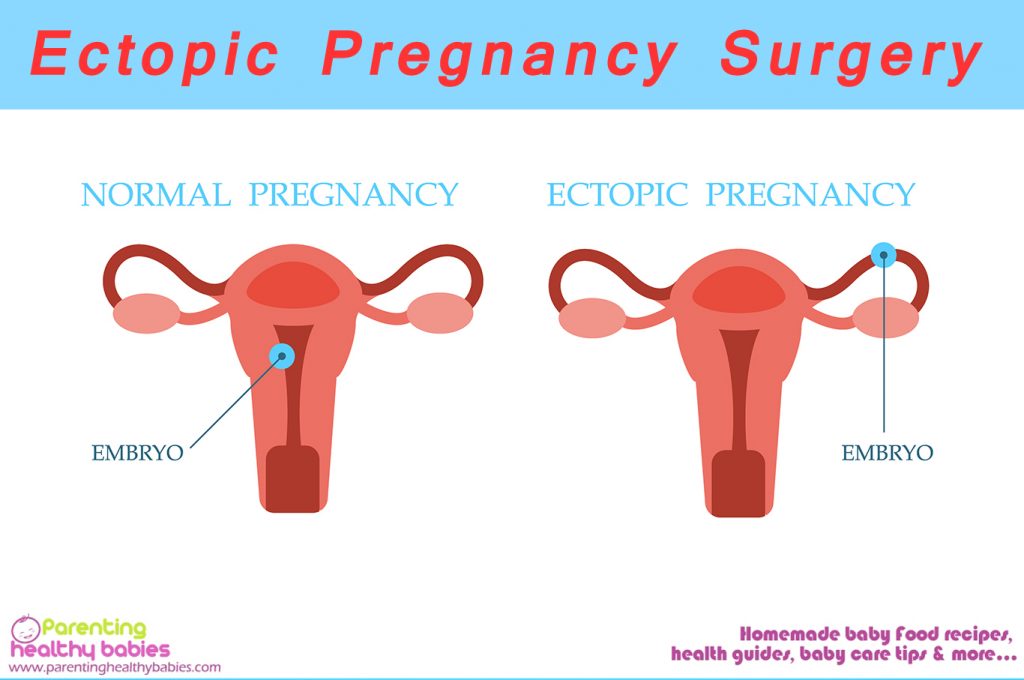Having an ectopic pregnancy can be a very traumatic experience for you. Understanding the causes, and consequnces of an ectopic pregnancy is the first step to recovery. Let’s have a look at some facts about ectopic pregnancy, surgery, and recovery time.
What is an ectopic pregnancy?
An ectopic pregnancy, also known as extrauterine pregnancy, occurs when a fertilized egg attaches itself in any place other than the uterus. Most commonly ectopic pregnancies occur in the fallopian tube. For this reason it is also often referred to as tubal pregnancy.
Due to the inability of the fallopian tubes to offer proper support to the growing embryo, the fertilized egg in an ectopic pregnancy must be treated. Surgery is often the treatment that is suggested for an ectopic pregnancy.
Types of Ectopic pregnancy
Ectopic pregnancies can be divided into the follwoing categories:
- Tubal pregnancy / ampullary pregnancy – Pregnancy occurring in the fallopian tube mostly located in the ampullary portion of the fallopian tube, almost 80% Ectopic pregnancies are tubal pregnancy
- Interstitial pregnancy – a pregnancy that implants within the interstitial portion of the fallopian tube
- Abdominal pregnancy—primarily implantation occurs on a peritoneal surface, secondarily, implantation originally in the tubal Ostia subsequently aborted and them re-implanted in the peritoneal surface
- Cervical pregnancy – implantation of the developing conceptus in the cervical canal
- Ligamentous pregnancy – a condition in which Ectopic and intrauterine pregnancies coexist
- Ovarian pregnancy—a condition in which an EP implants within the ovarian cortex
Read more: Ectopic Pregnancy- Signs, Symptoms, Causes, Treatment
Must Know Things about Ectopic Surgery
What are the kinds of ectopic surgery?
If the tube has become stretched or has ruptured and started bleeding, part or all of it may have to be removed. In this case, bleeding needs to be stopped promptly, and emergency surgery is necessary.
Laparoscopic surgery under general anesthesia may be performed. This procedure involves a surgeon using a laparoscope to remove the ectopic pregnancy and repair or remove the affected fallopian tube. If the ectopic pregnancy cannot be removed by a laparoscopically, another surgical procedure called a laparotomy may be done.
Recovering from the trauma of an ectopic surgery
Finding out that you have a tubal pregnancy is traumatic enough. Over that you also have to deal with the invasive and frightening ordeal of surgery. Your body is likely to go through the whole process of recovery following the surgery. The best thing for you to do at this time is to give your body the time to recover.
Here are some questions that you may have after undergoing treatment for an ectopic pregnancy.
Should I expect any pain or discomfort after the treatment? Is this normal? How long does the pain last after the treatment?
Pain and discomfort after an ectopic pregnancy treatment depends on the nature of treatment received. This may likely continue for several weeks after the process as your body continues to heal. In case of surgery your body is likely to take time to recover from the scarring which can result in abdominal pain.
This pain is likely to lessen as time progresses. Due to surgery also you may experience aches and pain in unexpected places You should try to relax and take the prescribed pain killers to help ease the aches.
If you notice that your pain is associated with other symptoms, you should consult your doctor. Symptoms mentioned below occurring with post-surgery pain should be taken seriously and given proper medical attention:
- Rise in normal body temperature more than 37° C (98.6° F)
- Increased vaginal discharge with fishy or offensive odor
- Raised lumps and bumps over the puncture sites or scar that are redder and hotter to touch than the rest of the surrounding skin
- Wound site which is not only weeping but appears to be oozing thick, creamy or white discharge
When will my wounds have healed?
Usually your wound should be clean and dry without any trace of weeping after 10 days of your surgery. In case you notice anything that worries you in your wound site contact your doctor immediately.
Once your skin has healed you can expect to have a raised and red scar for quite a few weeks and even months. This is not unusual. With time it will fade from red to pink and then eventually into silvery white.
As long as your wound site is comfortable, does not become sore to touch, does not begin to feel warmer than the surrounding skin and remains closed then you can be confident the wound is healed.
Why do I still have sore breasts few weeks after the surgery?
It is common for your breasts to feel sore immediately after and for few weeks after the surgery. This is because they are trying to get used to the physiological change of the body not being pregnant.
You may again experience the soreness of your breasts leading up to your next period. This is not an uncommon phenomenon and you need not worry.
However, if you feel major discomfort or pain, then it is always best to have your doctor take a look at the problem.
Is it normal to feel fatigued?
A major trauma such as ectopic surgery is likely to leave you feeling tired and not quite yourself. Any form of surgery is a huge event for your body to cope with and it is likely to direct all its immune system resources to heal your wounds.
Blood loss and type of treatment also has a great impact on your body. The bigger your operation, the more blood loss you are likely to suffer. The more the blood loss the greater time your body will take to recover to regain its usual vigour.
Generally it should take you six weeks to be fully physically recovered. However, for some it might take longer. That is not unusual. You can help your body recover from the fatigue by resting often and eating small healthy meals.
You can also expect to feel bloated post surgery. Though the length of time this continues for varies for each person, usually you should settle by six weeks. If the bloating continues past this time consult your doctor immediately. It could be a sign of an ongoing infection.
When can I return to my “normal” life?
This depends on how you were treated and what type of work you expect to do following the surgery. Usually you should be able to return to most types of jobs after six weeks. This is from a strictly physical point of view. You need to remember that recovering emotionally can take longer. It will vary for each individual.
Dealing with the devastating blow of loss of your baby along with the trauma of surgery can be indeed frightening. Dealing with “normal” routines, especially at work, may be emotionally draining. You are the best judge of how much you can handle emotionally and how soon.
You can start by working part-time. Even women who have been treated with Methotrexate tend to feel tired and exhausted more often. So remember to treat yourself with gentleness and accept that you may not be ready for work emotionally.
Take time to recover emotionally. Take as much time as you require, you can always ask your doctor to write you a note excusing you from work.
When can I have sex again?
You have to let your body recover fully, ovulation to occur, and the first period to arrive before you begin to have full penetrative intercourse again. Usually the wait time should be at least six weeks. This time will allow your muscles to heal and give you the confidence once more.
Ultimately you need to remember that the decision is up to you and your partner. If you feel you are both physically and emotionally ready even before the six weeks are up, it is ok. It is, however, important to consult your doctor before you try for another pregnancy.
It is advised by doctors that you should not get pregnant for two menstrual (period) cycles or three months after an ectopic pregnancy. In case you do want to have sexual intercourse before this time you should consider the use of contraception.
Is it necessary for me to follow up with the hospital post surgery?
If you have been treated medically with Methotrexate or have your fallopian tube intact, it is very important for you to get your blood monitored. In these cases the risk of persistent ectopic is much higher.
Incase you have had your fallopian tube removed, the chances are greatly reduced, however, your doctor might recommend a blood test. This is done before you leave the hospital to make sure levels are dropping.
You have the choice to opt for a post operative follow up with your doctor. However, if you feel Ok, there is no real medical need to see a doctor. If you have been allocated a follow up appointment at hospital this usually involves the doctor reviewing your medical notes. He is also likely to enquire about your health and recovery since your discharge from the hospital.
Some useful questions that you can ask your doctor during your follow up appointment are:
- Did he/she see any obvious reason why you had suffered the ectopic pregnancy at the time of surgery? For example, was there any damage to the fallopian tube?
- Was there any evidence of scar tissue or adhesions elsewhere in your abdomen?
- Did your remaining tube look healthy and intact?
- How long would he/she consider it reasonable for you to try to conceive without success before he/she would see you again?
- Will you need a separate referral for this?
- If and when you are next pregnant, what sort of support or early pregnancy screening will be available to you?
It is true that losing a pregnancy can be a traumatic experience for any woman. However, you need to remember that the chances of an ectopic pregnancy surviving full term is nil. But a planned and timely treatment can help save you future complications or a rupture.
Most women diagnosed with an ectopic pregnancy do not even need surgery to treat them. It is, no doubt, a scary situation, but you need to remember that many women who have had ectopic pregnancies have gone on to have one or more healthy pregnancies later on.
The secret is not to lose hope. You must relax once you have been diagnosed and take a planned treatment so as not to develop further complications. It is an emotional journey, no doubt, but it doesn’t mean it’s the end.













